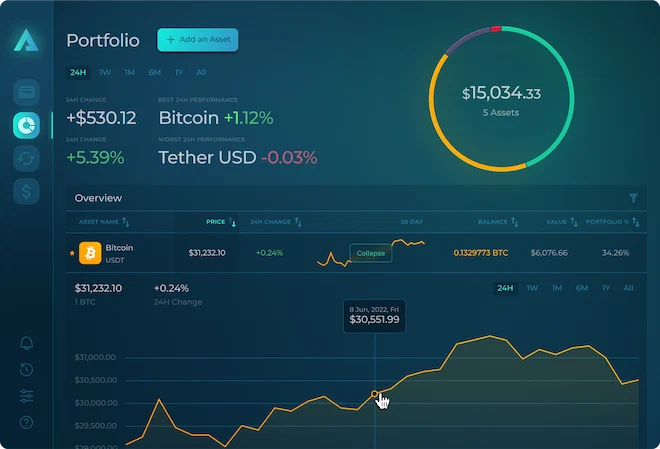Is Decentralization Really Important For Cryptocurrency Users?
Mar 29, 2023What brought you into cryptocurrencies? Generally, people would enter the world of crypto driven by investment opportunities or the financial freedom provided by DeFi. While decentralization is the most promoted concept aimed at demonstrating the merits of cryptocurrency, is it as important as it’s pledged to be?
Let’s discuss all things decentralization, how it works, and why understanding decentralization is vital for comprehending the crypto worlds and digital assets like Bitcoin and Ethereum.
What is Decentralization?
Simply put, decentralization is the type of management not involving a governing body, as opposed to centrally administered entities. A decentralized system has no small group of people in control possessing the ability to single-handedly make decisions.
| Source: Ace Infoway |
Blockchain is a method of decentralized data storage that is used to record and track various types of information. The Bitcoin creator Satoshi Nakamoto first described how decentralization can be applied to peer-to-peer payment networks in 2008. The document laid the basis for the new system of digital payments that would not depend on the government and other institutions.
While decentralization is strongly associated with cryptocurrencies, the application of blockchain technology is not limited to digital currencies and financial services: it is widely used in various industries, such as healthcare, logistics, and intellectual property.
Advantages of Decentralization for Crypto
Cryptocurrency decentralization is mainly achieved by storing the information simultaneously on many computers (nodes) around the globe maintaining the network. That comes with many benefits we further address.
Trust & Transparency
Decentralization ensures that no one can manipulate or forge records on the blockchain, as all changes must be agreed upon by consensus among network participants. Cryptocurrency transactions are validated by multiple nodes before being added to the block, which significantly reduces the number of errors.
Bitcoin, Ethereum, and other top blockchains do have a core developer team that suggests changes rather than enforcing them on participants. Decentralization applies to development decisions as well. Many blockchains are governed by DAO (Decentralized Autonomous Organizations), compiled of token holders that have access to voting on proposals for updates and changes while the devs serve the community.
| Dash Governance, Decentralization in Action / Source: Dashcentral.org |
Enhanced Security
The information on crypto operations is encrypted and stored on a multitude of nodes. Since there is no single point of failure, the decentralized system is more stable and secure.
Bitcoin has a massive community of node runners counting up to over 17,000 computers, which makes the strongest point in favor of Bitcoin supremacy in decentralization. Each contains the real-time updated history of every BTC transaction since 2009.
In order to compromise such a network, more than 51% of computers would need to be controlled, which is technically hard to implement.
Efficiency and Accessibility
As blockchain transactions are performed without intermediaries, it reduces the time and money required to process them. The only thing a user would need to start using crypto is a device connected to the internet, which is a far more accessible good than banking services, according to World Economic Forum.
To illustrate, having Arctic Wallet will cover all the basic needs of a crypto holder. Arctic is compatible with desktop, Android & iOS devices. After a three-step setup, users can immediately buy, exchange, send, and receive cryptocurrency. In other words, a wallet is enough to join and start exploring the vast crypto space.
| Arctic Wallet Desktop App |
Why Decentralization is a Big Deal in Crypto
Back in 2014, on TEDx Talks, one of the Ethereum founders Charles Hoskinson presented his vision of what decentralized platforms of the future look like and how they could change the lives of billions of people who lack representation in the world of finance — the key driver behind Hoskinson’s own project that would become Cardano.
Check out our Cardano overview for a deeper dive into project fundamentals.
Decentralized networks already open asset management up to more people. Based on Chainalysis data, cryptocurrencies have seen the most demand in developing countries, often suffering from unstable economies or hindered access to financial services — a testament to the decentralization vision viability.
| The Index of Cryptocurrency Adoption in the World Countries 2021/ Source: Chainalysis |
While inherently centralization is no evil and has its advantages, the continued failure of centralized finance (CeFi) and conventional banking systems to provide reliable services fosters the need for a safer option.
The Bitcoin white paper was published in 2008, at a time of economic hardship similar to today. Amidst financial institution turbulence, digital currency is again referred to as a “hedge” against political and governmental policies.
| Source: Cathie Wood via Twitter |
Challenges to Decentralization in The Crypto Space
The main roadblock for DeFi today is the absence of a comprehensive legal framework for the industry, which slows down its development. The user experience could also use improvements, as decentralized exchanges are tricky to navigate and have limited features compared to their centralized counterparts. This means that many people in the crypto community may end up using the more familiar CeFi out of convenience despite its drawbacks.
Additionally, blockchain developers currently need to depend on centralized cloud providers for resources like memory, compute power, and storage despite these being core tenets of decentralization. While progress is certainly being made in these areas, there's still much work to be done to make meaningful strides toward true decentralization in the crypto space.
In Decentralization We Trust
Decentralization has been touted for its advantages over CeFi, such as enhanced security, reduced risk and cost, and data integrity. Despite challenges and a long way to go, it appears that people do care about decentralization given their demonstrated preference for projects and networks with higher degrees of decentralization. As the crypto space continues to evolve, the focus on decentralization will likely increase, making it an essential factor for users to consider when evaluating cryptocurrency investment opportunities.
Meanwhile, Arctic Wallet is contributing to DeFi adoption by offering non-custodial storage for users willing to take full control over their hard-earned money and rest assured it’s kept safe.


